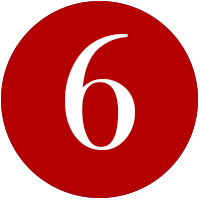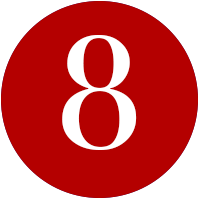Travel
Movement of CARICOM Nationals
Exceptions to the Right of Entry
The permission to enter shall be irrevocable, except for where a Member State can prove that a CARICOM National is “undesirable” or would become “a charge on public funds” wherein the scope of the refusal and the grounds on which it is should be based must be interpreted narrowly and strictly and the burden of proof must rest on the Member of State that seeks to invoke either ground.
Undesirability
The concept of undesirability must be concerned with the protection of public morals, the maintenance of public order and safety and the protection of life and health. While Member States have some discretion when invoking this exception, the scope of the concept of “undesirable persons” is subject to control by the major Community Organs, particularly the Conference, and ultimately by the Court as the Guardian of the Revised Treaty of Chaguaramas. Refusal on the basis of undesirability must be based on National law and on Community law but where the former is inconsistent with Community law, the latter must prevail.
A charge on public funds
A CARICOM Member State is entitled to assess on a strict, narrow, case by case basis whether a visiting CARICOM National may become a charge on public funds during his/her stay in the country. An assessment of whether a CARICOM national is likely to become a charge on public funds rests on whether the national appears to be in a position to support himself/herself during his/her intended length of stay.
In seeking to make such an assessment, a Member State must investigate whether the CARICOM National has sufficient funds for the period he/she intends to stay (as evidenced by the CARICOM National’s return ticket). The relevant factors may include cash, credit cards, access to funds, or being hosted in the receiving country. A Member State shall note that it is not reasonable to require a visiting CARICOM National to show sufficiency of funds for a period of six months if the person does not intend to stay that long.
Immigration officials may, therefore, ask to see the return ticket, as evidence of the intended length of stay. If the CARICOM National does not have a valid return ticket, the national may be given the opportunity to obtain one.
Elements of Hassle Free Travel
Below are the main elements needed to ensure safe and hassle free travel throughout all the CARICOM national states.
CARICOM Passport
Common lines for citizens and CARICOM Nationals
Common Embarkation / Disembarkation E/D Form
Member States are required to introduce the Common E/D Form, which was adopted before Cricket World Cup (CWC) 2007. This form has the Customs data at the back.
Six Month Definite Entry
CARICOM Nationals travelling to other Member States should be granted a definite entry of six (6) months, irrespective of the reason of their visit, subject to the right of Member States to reject undesirable persons and to prevent persons from becoming a charge on public funds.
Procedures for Entry

All CARICOM Nationals travelling within the Community should enter the special immigration lines designated for CARICOM Nationals.
CARICOM Nationals travelling within the Community should produce the following form of identification to the Immigration Officials at the point of entry:
- A valid passport; or
- The approved Community identification
.
The Community traveller should present his/her immigration (ED) form indicating the required period of stay.
The Immigration Official, having satisfied him/herself that all security and other reasonable precautions are taken, shall grant entry for a period of no less than six (6) months.
Complaints Procedure – Facilitation of Travel
A CARICOM national arriving in, transiting or departing a Caribbean Community Member State, and or seeking to exercise a right under the CSME, may have had certain experiences about which he / she wishes to file a complaint with the relevant authorities. The experience(s) may have been at a port of entry, after entry into a Member State, or both.
It is recognized that a CARICOM national should be afforded prompt judicial review of a decision taken under any of the free movement regimes including the right of entry. Prior to making a complaint concerning a decision taken under any of the free movement regimes, the CARICOM national should seek judicial review of the decision if this is available and it is feasible for him/her to so do. Failure to seek judicial review will not preclude a CARICOM national from filing a complaint.
Free Movement of Skilled CARICOM Nationals
Categories of persons afforded Free
Movement:
Introduction
Under the free movement of skilled CARICOM Nationals within the CSME as set out in Chapter Three (3) of the Revised Treaty of Chaguaramas. Article 45 of the revised Treaty of Chaguaramas states that:
“Member States commit themselves to the goal of the free movement of their nationals within the Community”.
Article 46 of the Revised Treaty and successive Decisions of the Conference of Heads of Government and various Councils of CARICOM, require Member States to implement a series of legal and administrative measures to ensure that all eligible categories (as agreed by the Council of Trade and Economic Development) of CARICOM Skilled Nationals can exercise their right as wage earners or non-wage earners to seek employment or engage in gainful legitimate economic activity.
Under the CSME, the free movement of persons across the region entails the removal of work permits for all eligible categories of persons (as agreed by Council of Trade and Economic Development). As at 2014, eligible categories are those shown in the adjacent box.
Definitions of Skilled CARICOM Nationals
The Council for Human and Social Development (COHSOD), in keeping with its obligations under the Revised Treaty has developed definitions for the ten (10) categories of approved skills for the purpose of facilitating free movement as follows:
I. University Graduates
Graduates, for the purpose of the free movement of skills, are persons who have obtained at least a Bachelor’s degree from a recognized university or a professional qualification which is equivalent to at least a Bachelor’s degree.
II. Media Persons
These are persons whose primary source of income is drawn from media and media-related work or persons who are qualified to enter this field.
Such persons perform the functions of:
- Media managers and administrators
- Editors and sub-editors
- Reporters, producers, announcers and broadcasters
- Camera operators, sound engineering and video technicians
- Production workers in the print and electronic media, etc.
- Graphic artists, cartoonists and photographers
- Editorial staff, programming staff and newsroom staff
- Other related personnel whose functions are not here classified
III. Sports Persons
These are persons who are active in or qualified to enter a particular field of sports with the specific purpose to earn a living as a professional or semi- professional.
Such persons perform functions such as, but not limited to:
- Athletes
- Coaches
- Team leaders
- Sports manager
- Sports promoter
- Massage therapists
- Events manager
IV. Artistes
These are persons who are active in or qualified to enter a particular field of art with the specific purpose to earn a living.
Artistes perform functions, such as, but not limited to:
Visual
- Fine Artists
- Costume builder
- Costume designer
- Fashion designer
- Set fashion
- Make-up artist
- Stylists
- Interior designer
- Textile designer
- Architect
- Landscape artist
- Graphic artist
- Print artist
Performance
- Dancer
- Actor
- Choreographer
- Director
- Performance Poet
- Storyteller
- Folk-performer
- Puppeteer
Literary
- Creative writer
- Novelist
- Poet
- Essayist
- Short-story writer
- Playwright
- Script-writer
- Lyricist
Cultural workers/
managers/ technicians
- Producer
- Stage designer
- Lighting technician
- Sound designer
- Sound technician
- Arts administrator
- Production assistant
- Holders of traditional knowledge
V. Musicians
These are persons who are active in or qualified to enter a particular field of music with the specific purpose to earn a living.
Such persons perform functions, such as, but not limited to:
- Player of musical instrument
- Singer
- Songwriter
- Band/orchestra leader
- Conductor
- Promoter
- Events manager
VI. Professional Nurses
These are persons who have successfully completed basic or higher level training for nursing; who are registered with the General Nursing Council of a CARICOM Member State and are designated Registered Nurses.
VII. Professional Teachers
Teachers are persons who have successfully completed an approved pre-service or in-service teacher preparation programme from an accredited/recognized institution offering teacher education.
VIII. Artisan
An artisan is a skilled workman/woman or craftsman/woman.
International Standard Classification of Occupations (ISCO)-88 gives the following description:
“Craft and related trades workers applying their specific knowledge and skills in the fields of mining and construction, form metal, erect metal structures, set machine tools’ or make, fit, maintain and repair machinery, equipment or tools, carry out printing work as well as produce or process foodstuffs, textiles, or wooden, metal and other articles, including handicraft goods.
The work is carried out by hand and by hand-powered and other tools which are used to reduce the amount of physical effort and time required for specific tasks, as well as to improve the quality of the products. The tasks call for an understanding of all stages of the production process, the materials and tools used, and the nature and purpose of the final product.
Tasks performed by craft and related trades workers usually include: extracting and working solid minerals; constructing, maintaining and repairing buildings and other structures; casting, welding and shaping metal; installing and erecting heavy metal structures, tackle and related equipment; making machinery, tools, equipment, and other metal articles; setting for operators, or setting and operating various machine tools; fitting, maintaining and repairing industrial machinery, including engines and vehicles, as well as electrical and electronic instruments and other precious-metal articles, pottery, glass and related products; producing handicrafts; executing printing work; producing and processing foodstuff and various articles made of wood, textiles, leather and related materials. Supervision of other workers may be included.”
IX. Holders of Associate Degrees or Comparable Qualifications
CARICOM Nationals who are eligible must be holders of an Associate Degree of Equivalent Qualifications who have obtained an Associate Degree from an accredited/recognized university or college or have obtained a professional, technical or vocational qualification which is comparable to an Associate Degree.
At its Sixteenth Meeting held in Guyana on 10-12 October 2007, the Council for Human and Social Development (COHSOD) agreed that comparable qualifications will be:
- 2 CAPE / ‘A’ Levels;
- Certified Accounting Technician Qualification;
- National Technician Certificates requiring two years of study at the post-secondary level;
- Other comparable qualifications to be identified and compiled in a comprehensive list for the guidance of the Competent Authority in Member States.
X. Household Domestics with a Caribbean Vocational Qualification (CVQ) or equivalent qualification
Requirements
Best Practice Procedure – Entry of a Skilled CARICOM National
CARICOM National:
A skilled CARICOM National shall present the following documents to the Immigration Officer at the Port of Entry:

A Valid CARICOM Passport

A Skilled National Certificate

Birth Certificate of Dependents (where necessary)

Marriage Certificate / Affidavit of common-law relationship
(where necessary)
Immigration Department:

The Immigration Department, on receipt of these documents, will conduct a search via the CSME Regime Administration System.

The Immigration Department shall advise the skilled CARICOM National of the Competent Authority within the Member State where verification of his/her SNC must be conducted should he/she wish to stay in the Member State for an indefinite period.

Where a match is found for the skilled CARICOM National on the CSME Regime Administration System, the Immigration Department shall grant the skilled national, spouse and dependents entry for definite period of six months.

The Immigration Official shall use the information provided to record the entry of the skilled CARICOM National and his/her dependents and make this information accessible to all other Departments such as the Departments of Labour, Inland Revenue, National Insurance and Statistics.
Other Eligible Categories
All Other Eligible Categories of Skilled CARICOM Nationals require:


Birth Certificates of Applicant






The Free Movement Desk
It’s Establishment
In order to receive applications of CARICOM Nationals for Free Movement or to execute verifications, the Competent Authority must assign a Department/Desk with the responsibility to administer the application process. The identified Department/Desk must be the only Department/Desk authorised to receive applications and supporting documents from interested CARICOM Nationals.
This Department/Desk will act as the Secretariat of the Free Movement Committee and consult with the Chairman on an on-going basis. Electronic applications via the CSME Document Workflow Management System will be first received and reviewed by this Department/Desk.
This Department / Desk will also be responsible for the submission every quarter, of up- to-date statistical information to the CSME Unit of the CARICOM Secretariat to the extent that these are not directly accessible from the CARICOM Document and Workflow Management System.
Free Movement Committee
The Free Movement Committee shall, where necessary, carry out the following checks on an application submitted by a CARICOM National:
a. Authentication Checks
b. Accreditation Checks
c. Immigration Background Checks
The Free Movement Committee shall use the results of all checks conducted as the basis of a recommendation to the assigned Minister or Authorized Signatory of the SNC.
It’s Procedures




Upon approval by the Minister or Authorized Signatory to grant a CARICOM National a SNC, the Free Movement Desk will inform:
- The Inland Revenue Department in the Member State (with respect to the Issuing of a Taxpayer Registration Identification Number)
- The Social Security Agency in the Member State (with respect to the Issuing of a Social Security Number)
Minister or Authorized Signatory:
The assigned Minister or Authorized Signatory shall use the recommendation received from the Free Movement Committee as a basis for approval and final release of the Skilled National Certificate for printing and/or electronic verification.
Immigration Department:
The Immigration Department shall, upon receipt of an approved SNC from the Minister or Authorized Signatory:

Affix the signed Skilled National Certificate in the CARICOM National’s passport

Grant the CARICOM National “Indefinite-Stay” in the Member State

Where necessary, grant the dependents of the CARICOM National “Indefinite-Stay” in the Member State










